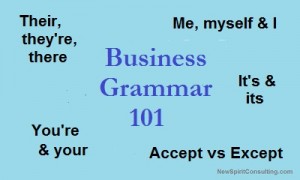There seems to be a horrible lack in good grammar and spelling online. I've seen it in websites, emails and social media, but product launch materials are the worst offenders. 
You may be thinking, 'What does it matter if my customers understand what I'm saying?'
First, are you sure they understand you?
Maybe you wrote 'through' when you really meant 'thorough.' Thorough means 'all-encompassing.' In other words you were careful, complete, comprehensive, exhaustive, and/or meticulous. That's very different from 'through' which means done. If you really meant you were done, you could have used other words such as over, completed, finished, terminated, wrapped up.
And please tell me you didn't abbreviate it to 'thru.' That's fine when you're texting a friend, but not okay in business writing.
Second, poor spelling and grammar tells your customers that you don't really care about them. You haven't taken the time to be complete and correct. That can make them wonder whether the product or service you offer is also slip-shod.
Often misused words and how to use them correctly:
- There, their and they're probably top the list of the most commonly misused words. 'The students indicated they're finished as they put their paperwork on the teacher's desk over there.'
To figure it out, try substituting 'they are' - if it makes sense, use the contraction 'they're.'
If it doesn't make sense, are you talking about possession? Try substituting the word 'our.' If the sentence still makes sense, use 'their.'
Are you talking about a place? Try substituting 'here' for 'there.' It can also mean something exists, such as, 'There are two dogs.'
- It's and its are pretty easy to get correct. If you can substitute 'it is' or 'it has' use the contraction 'it's.' Use 'its' for everything else.
- Your and you're are often confused, but just as easy to find the correct one. Try substituting 'you are.' If it makes sense, use 'you're' and if it doesn't make sense use 'your.' 'You're mistaken in your belief that the sky is green.'
- Whether and weather are a little harder. 'Whether' is similar to 'if' - 'I'm playing football, whether it's raining or not.' 'Weather' is about the atmospheric conditions - 'The weather outside is frightful.' But it can also be used as a verb meaning to withstand or endure or, to make it more complicated, to erode over time - 'We'll weather the storm in that bay' or 'The surface of the rock weathered over time.'
To make it more interesting, there is another word that sounds the same, but you probably won't use very often. 'Wether' is a castrated male sheep.
- Affect and effect or accept and except sound almost identical and yet have very different meanings. These can be a little harder to figure out.
If you're comfortable with sentence structure, effect is a noun and affect is a verb. Some people use the phrase 'Affect the Effect' - in other words something happened (affect) that caused a consequence (effect). You can try substituting 'consequence' and if the sentence still makes sense, use 'effect.' Otherwise 'affect' is probably correct.
- Accept and except are also different types of words. Accept is a verb and except can be a preposition, a conjunction or sometimes a verb. No wonder these words are so often confused! Accept means to receive something. Perhaps the easiest tip I've heard is to remember 'EXcept' means to EXclude something and Accept means to Add something. 'He accepted the Academy Award' or 'I don't like lawyers, present company excepted.'
Me, myself and I
Another of my pet peeves is the incorrect usage of me, myself and I. For some reason people are afraid to use the word 'me' and stick 'myself' in there where it doesn't belong. Generally speaking, if you're trying to emphasize your role in something and have already used the word 'I' in your sentence, you can add 'myself' - 'I kept half the loot for myself.' Otherwise don't use it.'Me' and 'I' tend to get confused when you're talking about you and another person. To make it easy, drop the other person from the sentence. If 'Barbara gave a present to I' doesn't sound right, then don't say 'Barbara gave a present to my wife and I.' It should be 'Barbara gave a present to my wife and me.' If 'Me wrote the play' doesn't sound right, then 'Jim and me wrote the play' is wrong as well. And, no, that doesn't mean you can stick 'myself' in there. The correct sentence would be 'Jim and I wrote the play.'
Quotes and sayings
More problems occur when someone tries to quote a familiar saying and gets it wrong. Recently I was reading some marketing material from a large, well-known company and a phrase - 'take the reigns' - brought me to a screeching halt. The correct phrase is 'take the reins.' Reins are the leather straps the stagecoach driver uses to control the horses in old western movies.
The writer was trying to say their customers should be in control - thus 'take the reins' - but got confused with the word 'reign' which means royal rule or authority. Sounds reasonable, but still incorrect.
Here is a post about the difference between rein and reign. Unfortunately the mistake has become commonplace so people are accepting the mistake rather than correcting it.
And please tell me you've never used the word 'rain' - meaning water that falls out of the sky - in this old saying. I hope it's clear why it would be incorrect.
Also if you'd like to learn about the origin of some phrases, such as bite the bullet or spill the beans, check out this website.
So how do you fix these faux pas?
Look it up! Here is a very helpful website - http://dictionary.reference.com/
Another option is to use a program such as Microsoft Word to check your spelling and grammar. But remember it is just a tool and there may be times when you won't accept the suggestions. For example, some product names use creative misspellings. Or maybe you want to write more creatively, such as in the Hemingway style. In the dark. In the rain. Yep, those phrases would be flagged because they aren't complete sentences.
There are times to break the rules, just make sure you're not breaking the rules because you're too lazy to check correct usage first.
If you want to go a step further, try using the thesaurus to find similar words. Remember the list above - comprehensive, exhaustive, meticulous? Those are synonyms for the word, 'thorough.'
To make your writing really sparkle, try looking up a few words to see if there's a synonym that more completely expresses your feeling and use it instead. Just don't go overboard and make your writing hard to understand.
Microsoft Word has a thesaurus function or you can try http://www.thesaurus.com/ to look up a word.
Now that you know my pet peeves, what words or phrases make you think of fingernails on a chalkboard?




